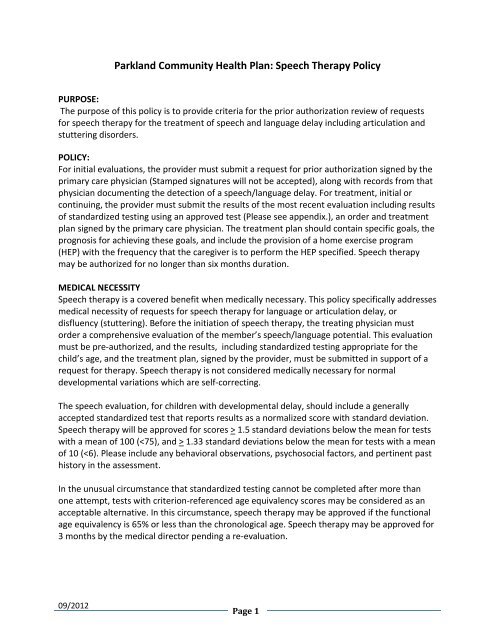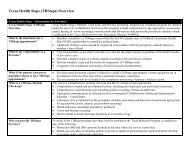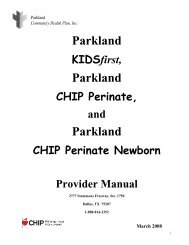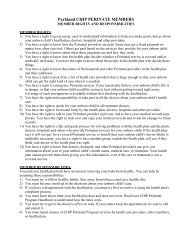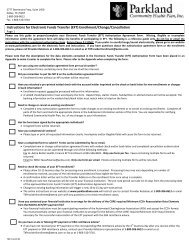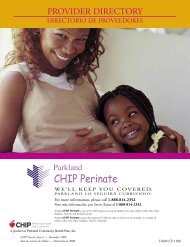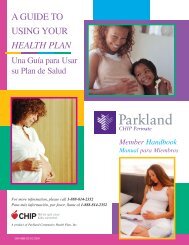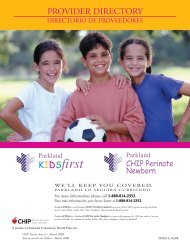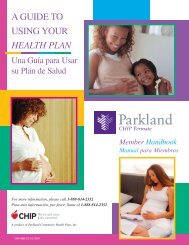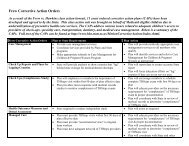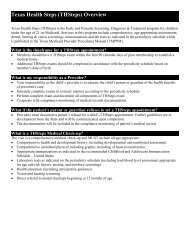Speech Therapy Policy - Parkland Community Health Plan, Inc.
Speech Therapy Policy - Parkland Community Health Plan, Inc.
Speech Therapy Policy - Parkland Community Health Plan, Inc.
You also want an ePaper? Increase the reach of your titles
YUMPU automatically turns print PDFs into web optimized ePapers that Google loves.
<strong>Parkland</strong> <strong>Community</strong> <strong>Health</strong> <strong>Plan</strong>: <strong>Speech</strong> <strong>Therapy</strong> <strong>Policy</strong><br />
PURPOSE:<br />
The purpose of this policy is to provide criteria for the prior authorization review of requests<br />
for speech therapy for the treatment of speech and language delay including articulation and<br />
stuttering disorders.<br />
POLICY:<br />
For initial evaluations, the provider must submit a request for prior authorization signed by the<br />
primary care physician (Stamped signatures will not be accepted), along with records from that<br />
physician documenting the detection of a speech/language delay. For treatment, initial or<br />
continuing, the provider must submit the results of the most recent evaluation including results<br />
of standardized testing using an approved test (Please see appendix.), an order and treatment<br />
plan signed by the primary care physician. The treatment plan should contain specific goals, the<br />
prognosis for achieving these goals, and include the provision of a home exercise program<br />
(HEP) with the frequency that the caregiver is to perform the HEP specified. <strong>Speech</strong> therapy<br />
may be authorized for no longer than six months duration.<br />
MEDICAL NECESSITY<br />
<strong>Speech</strong> therapy is a covered benefit when medically necessary. This policy specifically addresses<br />
medical necessity of requests for speech therapy for language or articulation delay, or<br />
disfluency (stuttering). Before the initiation of speech therapy, the treating physician must<br />
order a comprehensive evaluation of the member’s speech/language potential. This evaluation<br />
must be pre-authorized, and the results, including standardized testing appropriate for the<br />
child’s age, and the treatment plan, signed by the provider, must be submitted in support of a<br />
request for therapy. <strong>Speech</strong> therapy is not considered medically necessary for normal<br />
developmental variations which are self-correcting.<br />
The speech evaluation, for children with developmental delay, should include a generally<br />
accepted standardized test that reports results as a normalized score with standard deviation.<br />
<strong>Speech</strong> therapy will be approved for scores > 1.5 standard deviations below the mean for tests<br />
with a mean of 100 ( 1.33 standard deviations below the mean for tests with a mean<br />
of 10 (
Requests for treatment of disfluency must be accompanied by a standardized evaluation such<br />
as the Stuttering Severity Instrument for Children and Adults (SSI) and a description of<br />
concomitant features. Disfluency is a common condition in young children with onset after age<br />
3 and is usually self-correcting by age six to seven. This is sometimes referred to as normal nonfluency<br />
and is not an indication for speech therapy.<br />
The number of therapy visits authorized will be based on the severity and type of condition.<br />
Frequency of therapy is expected to be 1-2 times per week up to a maximum of 3 times per<br />
week for severe problems. There is no evidence that therapy more often than 3 times per week<br />
improves outcomes.<br />
Initial therapy will not be approved when:<br />
1. The test results are in the normal range.<br />
2. The language delay is the result of English being a second language.<br />
3. The proposed therapy is considered to be experimental and investigational.<br />
4. The proposed therapy is solely educational such as grammar, vocabulary or other<br />
subjects which are part of a school curriculum.<br />
A re-evaluation is required every 6 months for continuation of therapy unless the medical<br />
director requests it more frequently. The same standardized tests must be utilized for reevaluation<br />
as were used to evaluate the member initially unless these are no longer<br />
appropriate for the member’s age.<br />
A request for continuation of therapy must include the following documentation:<br />
• A referral and authorization form, including a current, handwritten prescription and/or<br />
treatment plan with the original physician’s signature and date<br />
• Documentation of progress made from the beginning of the previous treatment period<br />
to the current service request date, including progress towards previous goals and the<br />
number of treatments used to date from the previously authorized visits.<br />
• Documentation of the parent/member’s attendance and participation in the therapy<br />
sessions.<br />
• Documentation of the provision of a home exercise program and the parent/member’s<br />
performance of that program.<br />
• Assessment of the member’s capability for continued measurable progress<br />
• A proposed treatment plan for the requested extension dates with specific goals related<br />
to the client’s individual needs.<br />
Results of patient-specific measures should demonstrate that the individual is consistently<br />
improving and that a plateau (i.e., where no additional meaningful improvements are being<br />
measured or are expected to occur) has not been reached.<br />
Continued therapy is no longer medically necessary and will not be approved when:<br />
1. Test scores have improved to within 1.33 SD from the mean; or<br />
09/2012<br />
Page 2
2. The member has not made significant progress towards meeting goals and/or<br />
improvement in standardized scores.<br />
If the member has actively participated in the treatment plan and has made measurable<br />
progress towards language goals in the first six months, an additional six months may be<br />
approved. Further therapy will not be approved if there is no improvement in standardized test<br />
scores by 12 months.<br />
If continuation of therapy is not approved because the child has reached goal or is no longer<br />
progressing, he/she may be re-evaluated in 3-6 months to determine if deterioration of<br />
function has occurred and additional therapy is medically necessary.<br />
If therapy for language delay is to be continued beyond 12 months and the member has no<br />
underlying medical condition associated with developmental delay (Autism, Autism Spectrum<br />
Disorder, or Pervasive Developmental Disorder), the member must be seen by the primary care<br />
provider (PCP) for developmental assessment. This should include the Ages and Stages<br />
Questionnaire (ASQ) or the Parents’ Evaluation of Developmental Status PEDS) together with<br />
the Modified Checklist of Autism in Toddlers (M-CHAT). If the PCP is not able to perform this<br />
assessment, the member may be referred to a developmental pediatrician or a pediatric<br />
neurologist. <strong>Therapy</strong> may be authorized for a period of up to 2 months beyond the date of the<br />
scheduled evaluation.<br />
<strong>Therapy</strong> providers are required to refer children younger than 35 months to Early Childhood<br />
Intervention within 2 business days of identification according to Sec. 5.1.5 of the Texas<br />
Medicaid Providers Manual. In addition, therapy providers must refer preschool children to<br />
Head Start, or to the school district for evaluation for inclusion in the Preschool Program for<br />
Children with Disabilities (PPCD) depending upon the severity of the child’s developmental<br />
delay, or provide documentation of parental refusal. If the child is enrolled in school, therapy<br />
providers must coordinate services with the school, including obtaining a release of information<br />
or document refusal of the parents to consent.<br />
Fax completed referral forms and clinical information to <strong>Parkland</strong> <strong>Community</strong> <strong>Health</strong> <strong>Plan</strong> fax<br />
number: 800-240-0410. For assistance with coordination of care, members changing health<br />
plan or therapy providers, call HEALTHfirst (Medicaid) 888-672-2277 or KIDSfirst (CHIP) 888-<br />
814-2352.<br />
To appeal a denied or partially denied service, please refer to the denial letter and the <strong>Parkland</strong><br />
<strong>Community</strong> <strong>Health</strong> <strong>Plan</strong> provider manual for the process.<br />
09/2012<br />
Page 3
Acceptable Standardized Tests (list is not all inclusive)<br />
• Arizona Articulation Proficiency Scale-3 (AAPS)<br />
• Preschool Language Scale-5 (PLS-5)<br />
• Clinical Evaluation of Language Fundamentals (CELF)<br />
• Clinical Assessment of Articulation and Phonology (CAAP)<br />
• Expressive One-Word Picture Vocabulary Test (EOWPVT)<br />
• Goldman Fristoe Test of Articulation -2 (GFTA-2)<br />
• Oral Written Language Scale (OWLS)<br />
• Peabody Picture Vocabulary Test-2 (PPVT-3)<br />
• Recessive Expressive Emergent Language-3 (REEL-3)<br />
• Receptive One-Word Picture Vocabulary Test (ROWPVT)<br />
• Test of Language Development (TOLD-P4)<br />
• Stuttering Severity Index (SSI-3)<br />
• Spanish Preschool Articulation Test (SPAT)<br />
Note: We will accept any normed test that measures the functional area of the potential delay.<br />
09/2012<br />
Page 4


